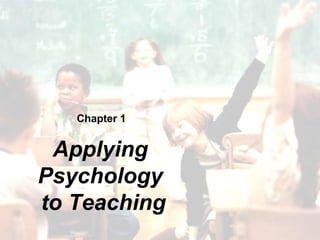
APPEL PSY 263 401 Chapter 1
- 2. © 2013 Cengage Learning. All rights reserved. 1 | 2 Overview • What is Educational Psychology? • How Will Learning About Educational Psychology Help You Be a Better Teacher? • The Nature and Values of Science • Complicating Factors in the Study of Behavior and Thought Processes • Good Teaching Is Partly an Art and Partly a Science • Reflective Teaching: A Process to Help You Grow From Novice to Expert
- 3. © 2013 Cengage Learning. All rights reserved. 1 | 3 What is Educational Psychology? • Educational psychology is …“a scientific discipline that uses psychological constructs and research methods to understand how the various characteristics of students, teachers, learning tasks, and educational settings interact to produce the everyday behaviors we see in school settings.”
- 4. © 2013 Cengage Learning. All rights reserved. 1 | 4 How Will Learning About Educational Psychology Help You Be a Better Teacher? • Teaching Is a Complex Enterprise Educational psychology provides information about the many factors that affect teaching and learning • Research Can Inform Teachers Educational psychology offers useful and tested ideas for improving instruction • Coursework and Competence Educational psychology helps prepare teachers to be effective by providing them with pedagogical content knowledge
- 5. © 2013 Cengage Learning. All rights reserved. 1 | 5 Teaching is a Complex Enterprise • Teaching is in top quartile on complexity for all occupations Teachers are responsible for diverse populations with varied needs Teachers are constantly making decisions before, during, and after instruction Teachers need to be knowledgeable about many things and have a wide range of skills
- 6. © 2013 Cengage Learning. All rights reserved. 1 | 6 Research in Educational Psychology Informs Teaching • Examples: Use more advanced students to tutor less advanced students Give positive reinforcement and corrective feedback to students Communicate to students about expectations Require students to respond to higher-order questions Provide students with cues about the upcoming tasks
- 7. © 2013 Cengage Learning. All rights reserved. 1 | 7 Research in Educational Psychology Informs Teaching Cont. • Examples continued: Teach students how to monitor and improve their own learning efforts Know students’ misconceptions Create learning situations where students customize information and problems for themselves Accept responsibility for student outcomes Show students how to cooperate
- 8. © 2013 Cengage Learning. All rights reserved. 1 | 8 Coursework and Competence • Teachers who have had relevant coursework in education and psychology are likely to be more competent and satisfied with their training than teachers who lack such coursework See Online Video Case (Chapter 16) “Teaching as a Profession: What Defines Effective Teaching?”
- 9. © 2013 Cengage Learning. All rights reserved. 1 | 9 The Nature and Values of Science Non-Scientific Observation Vs. Scientific Observation
- 10. © 2013 Cengage Learning. All rights reserved. 1 | 10 Limitations of Non-Scientific Observation • May draw false conclusions because particular beliefs or experiences are simply assumed to be true. Thus, alternative explanations are not considered or idiosyncratic factors are given too much importance • Retaining students in a grade is an example of a practice that results from non-scientific observation
- 11. © 2013 Cengage Learning. All rights reserved. 1 | 11 Strengths of Scientific Observation • A systematic, scientific approach to studying educational problems is characterized by: a representative sample of subjects control of non-relevant variables objectivity published procedures and results replication by others
- 12. © 2013 Cengage Learning. All rights reserved. 1 | 12 Complicating Factors in the Study of Behavior and Thought Processes • The Limited Focus of Research • The Complexity of Teaching and Learning • Selection and Interpretation of Data • New Findings Mean Revised Ideas
- 13. © 2013 Cengage Learning. All rights reserved. 1 | 13 Good Teaching is Partly an Art and Partly a Science • The Argument for Teaching as an Art Motives, beliefs, emotions, values, flexibility, are all part of successful teaching • The Argument for Teaching as a Science Usable body of research findings
- 14. © 2013 Cengage Learning. All rights reserved. 1 | 14 Good Teaching is Partly an Art and Partly a Science Cont. • The Teacher as Artistic Scholar: Combining the Art and Science of Teaching The artistic scholar strikes a balance between the art and science of teaching by using research findings as ideas that might be applicable to a particular group of students at a particular point in time
- 15. © 2013 Cengage Learning. All rights reserved. 1 | 15 Reflective Teaching • Reflective teachers: Make extensive use of formative assessment to generate information on which to reflect Have an introspective orientation, are open- minded but questioning, take responsibility for their decisions and actions Are able to use compelling evidence in support of a decision